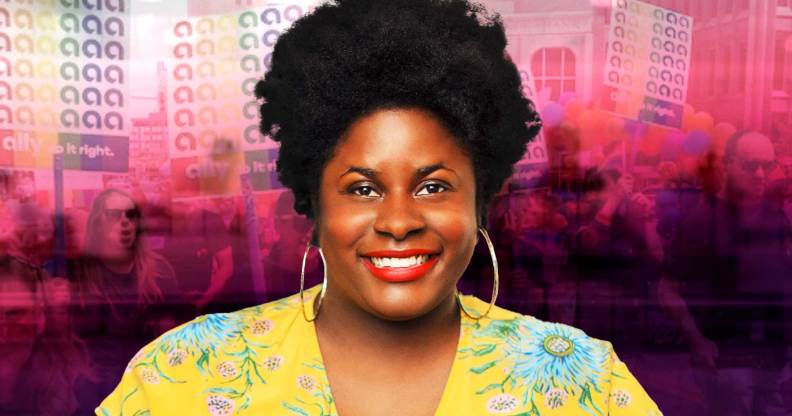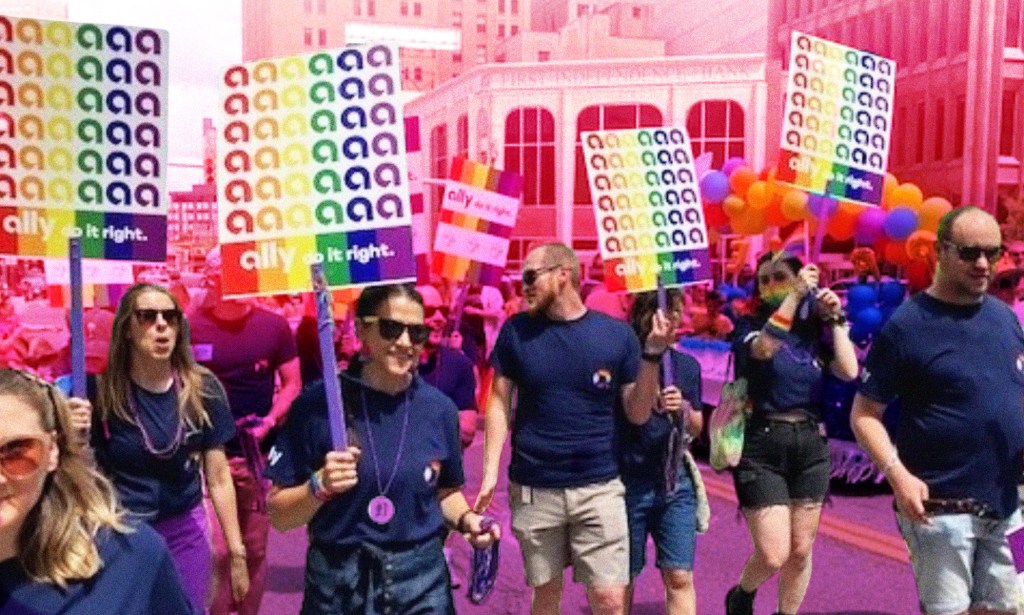‘Girl, it’s going to be OK’: How LaToya Lyn took control of her own financial security

LaToya Lyn worked a full-time job in high school to afford college. (Supplied/PinkNews)
Reflecting on her time in college, LaToya Lyn recalls one particularly profound moment.
She tells PinkNews: “It’s my first semester in undergrad, and they said to me: ‘Whatever you learn here, don’t take it and copy it, take it and build on it.’
“That was so aligned with my values of why I went to school.”
LaToya committed herself to higher education because she “wanted to have the resources and the abilities to continue to grow.”
Growing up as a young LGBTQ+ person in New York City in a barely middle-class family, LaToya knew that she would have to rely on herself to get access to those resources.
“There was a lot of responsibility on myself to be financially capable,” she recalls.
“I had to learn on my own to know what it means to save money, what it means to build for the future: it means to really work hard.”
LaToya worked a full-time job, 40 hours a week while finishing high school to fund her first year of college. She said it was an easy motivation.
“It was very binary,” she says, “either I do it, or if I didn’t do it, I wouldn’t be able to go to school.
“I had to create the opportunities for myself because no one was going to do it for me.”
Ally Financial, a US-based digital financial services company, notes research that says that over 50 per cent of LGBTQ+ people feel overwhelmed by financial topics and have a tough time picturing their futures.
‘Girl, it’s going to be ok’
After LaToya graduated college, she quickly found herself climbing the corporate ladder to where she now sits as the global head of people for a large software development company.
As she looks back on her career and financial success, LaToya believes that there are a few foundations for financial security and stability: “There’s no such thing as fast money and not all money is good money.”
She recalls that her thought process around financial stability back then had three separate levels: The first involved ensuring that all the basic needs were met. The second level established certain extras or luxuries like being able to afford a nice car or take a proper vacation somewhere.
Now, LaToya says she’s in the third level of financial stability: “How do I get money to make more money for myself?”
She believes that having the acumen to make assured investment decisions can also enhance financial security.
LaToya says that the 15-year-old version of herself wouldn’t “have imagined myself being here, but it felt very real when all these things happened to me.”
If she could tell that 15-year-old anything it would be: “Girl, it’s going to be okay. You’re going to be able to do more for yourself but also do more for others.”
As a first-generation LGBTQ+ Black woman who took control of their own financial security early on in life, LaToya offers simple yet stark advice to others looking to do the same.
“Believe your gut and understand that it’s okay that you don’t have generational wealth – it’s not your fault.”
She also urges people from marginalised communities to remember the achievements of generations before them.
“We are our ancestors’ wildest dreams,” she says. “If they were able to overcome all of these different things, we absolutely can ourselves.
“We just got to understand the battlefield that we’re playing on.”
‘It cannot be me, and it cannot be anyone else’
From a high school student working retail to paying her way through college to now her role in the C-Suite, LaToya loves to share advice about the approach of company leaders to diversity, equity and inclusion (DE&I).
“The only way an organisation can be successful in any type of diversity, equity, inclusion and belonging is if the CEO is the head of diversity, equity, inclusion and belonging.
“It cannot be me, and it cannot be anyone else.”
LaToya explains that while others can help create and implement best practices, the only way for a business to commit to DE&I is through the leader of the company, who is ultimately responsible for it.
“They [CEOs] create the landscape on how the organisation is structured,” she asserts.
“They’re responsible for how that organisation looks and if it’s inclusive or not.”
LaToya acknowledges that while many capable and effective DE&I leaders are people of colour because they understand what it means to be inclusive, the onus shouldn’t be put on them.
“Newsflash,” she says, “people of colour did not create the systemic racism issues within the corporate environment. It was the CEOs and the leaders of the organisation.
“I can give you the best practices, but if you want to be successful and you want your organisation to be successful, it can’t be an offshoot person in the HR department.
“It has to be the CEO.”

‘It’s different people in different phases’
While LaToya’s career progression was largely motivated by her own drive and resilience, she does acknowledge the role that support from others played in her professional and personal growth.
“There isn’t that one person that extends their hand and reaches out for you,” she says.
“It’s different people in different phases.”
LaToya remembers a lab director who noticed her drive as she quickly progressed from cleaning to eventually co-leading the lab.
“He was an ally because he really understood me as a whole person,” she recalls.
“I never forgot what he said: ‘LaToya, you’re going to go far in life because you know how to get your foot through the door’.”
LaToya believes that people will always have a desire to support people that are trying, and that that type of allyship was crucial to her career and financial progression.
“People saw my foot sticking through the door and they said: ‘Come in, I’ll make some room for you.'”

